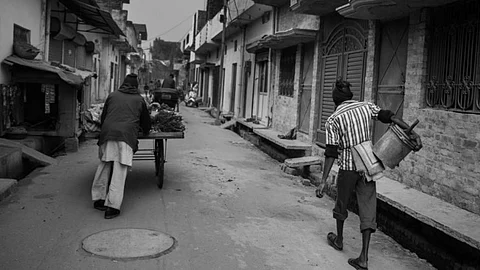
- Topics
- Feature
- Opportunities & Events
- Data
- Hindi Portal
- Topics
- Feature
- Opportunities & Events
- Data
- Hindi Portal

Hundreds gathered to release the Safai Karmachari Manifesto ahead of Lok Sabha elections 2019 at the Indian Social Institute, Delhi on April 4, 2019. The manifesto was released by the Safai Karmachari Andolan (SKA), a movement for the elimination of manual scavenging and restoring the rights of the 1.2 million people who are engaged in this under completely degrading and life-threatening conditions.
Even though the employment of people as manual scavengers was banned in 1993, followed in 2013 by a law banning manual scavenging in all its forms, the practice continues and no one has been convicted for employing a manual scavenger till now as it is difficult to prove the charges. "It's a national shame that the practice of making one human being manually clean the excreta of another still continues in the country," says Bezwada Wilson, national convener of SKA while releasing the manifesto.
“Even after seeing our plight, all the governments, both at the Centre and states, as well as the Prime Minister choose to remain silent. As long as we are being forced into manual scavenging, to risk our lives for this dangerous occupation, just because of our castes, this country cannot be considered a democracy,” says Deepthi Sukumar, the national core member of SKA.
The manifesto developed by SKA after conducting meetings and consultative surveys across 10 states calls to break the shackles of caste, patriarchy, and ensure the recovery, reconstruction, and reclamation of the fundamental right of manual scavengers to live with dignity. It registered the specific demand made by the manual scavengers to provide a Right to Life (RL-21) card to ensure direct and free access to education, health care, dignified employment and livelihoods. This also includes other benefits and schemes as per the fundamental rights given to all citizens of India under Article 21 of the Indian Constitution.
The manifesto is being sent to political parties. “Political parties should know that if they want to stay in power, they have to care about the welfare of safai karmacharis,” says Usha Ramanathan, board member of SKA. The manifesto demanded that one percent of the union budget be exclusively allocated for the welfare of manual scavengers, including their liberation and rehabilitation benefits, and a separate ministry created for their release and rehabilitation headed by the Prime Minister.
The other demands listed in the manifesto include pension of Rs 6,000 per month to all safai karmacharis above 55 years of age, direct access with free admission for their children using the RL-21 card into any institution and hostels (government, aided, private and foreign institutions) of their choice from primary to the highest level of education. Direct and free access to any hospital (government or private) of their choice by using the RL-21 card for all their medical needs including the most specialised medical intervention. It has also demanded free water and sanitation facilities for every safai karmachari household.
“This is the biggest moment in our history. This is the first time we, the manual scavengers, are releasing our manifesto. We do not want a government that does not care about us. These are our demands, and we are not requesting the people in power to meet them, we are ordering them," says Wilson.
Among other things, the manifesto demands an apology from the Prime Minister of India for the historical injustice done to people engaged in manual scavenging. The manifesto called for including manual scavenging under the National Crime Records Bureau. It reads, “Make on-the-spot registration of instances of engaging as manual scavengers as a criminal act under the 2013 Manual Scavenging Prohibition Act. There have been 31 documented sewer deaths in the last three months. There is a visible prevalence of dry latrines and manual scavenging in many states across India with documented evidence. These atrocities should be registered as criminal cases and recorded under the National Crime Records Bureau.”
SKA also called for increasing the compensation in case of sewer deaths to Rs one crore. The manifesto calls for the abolition of a contractual system which results in the exploitation of workers. It also calls for a special session of the parliament to end manual scavenging by humans, rehabilitation of sanitation workers, and for putting an end to sewer deaths.
Sukumar adds, “This manifesto lists what we want, how we envision our democracy to be. We will send this to all the political parties. We will vote for them only if they are ready to meet all our demands.”